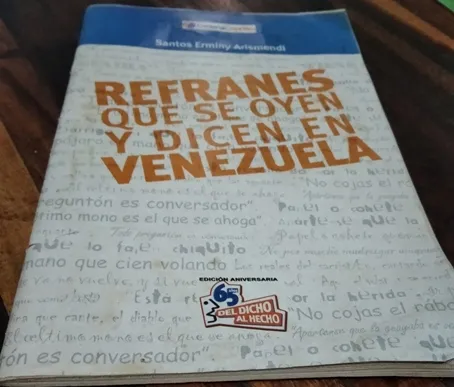Hola a todos, queridos lectores, saludos a mis compañeros de Hive Cross Culture!, espero que este mes del amor y la amistad les traiga muchos buenos momentos. Siguiendo con mi seriado “Cinco sabios refranes venezolanos”, hoy les entrego la Décima Primera Parte del mismo; y como siempre presento cinco de los dichos más comunes en mi país, Venezuela; los que extraigo del libro “Refranes que se oyen y dicen en Venezuela”, cuyo autor es Santos Erminy Arismendi, libro publicado por la Cadena Capriles en el año 2006, el cual venía encartado gratis en el periódico “Últimas Noticias”. Como siempre, los análisis y comentarios son elaborados por mí. Al final de este post están los enlaces que les llevarán a las 10 primeras entregas.


Un refrán ampliamente conocido, similar al que dice “El cazador salió cazado”, y se puede interpretar a que se fue a hacer una diligencia con fin de ganar u obtener alguna ventaja, y en vez de ello, sale perdiendo.
Creo que es un refrán machista, pues se utiliza para decir que los padres no atienden a sus hijos, lo cual era muy común antes, en décadas anteriores. Sin embargo, actualmente este paradigma está cambiando y los padres en muchas ocasiones sí se integran a la educación de sus hijos; aún así lo he podido oír en algunos hombres, indicando que se desentienden de sus tareas cotidianas relativas al cuido de sus hijos.
También creo que es un refrán machista, porque es una especie de advertencia hacia el género femenino, indicándole que no le puede reñir a su pareja, para evitar que la abandone. Lo he oído con ciertas variantes .
Este dicho se aplica para aquellas personas que tienen un vicio, entonces deben cargar su respectivo abastecimiento del mismo. Por ejemplo, si fuman, deben cargar sus cigarrillos, si les gustan las bebidas alcohólicas, que lleven consigo su licor o el dinero para adquirirlo. Es un refrán que también sirve para poner límites a terceros.
Es un refrán ampliamente utilizado a lo largo y ancho de Venezuela, pero en vez de la palabra fuñido se usa su equivalente, jod…; jajaja, y es por lo general una manera de responder un saludo, e implica que a pesar de las adversidades de la vida, se mantiene el buen humor.

Hello everyone, dear readers, greetings to my fellow Hive Cross Culture! I hope this month of love and friendship brings you many good times. Continuing with my series "Five wise Venezuelan sayings", today I give you the Eleventh Part of it; And as always I present five of the most common sayings in my country, Venezuela; those that I extract from the book "Sayings that are heard and said in Venezuela", whose author is Santos Erminy Arismendi, a book published by Cadena Capriles in 2006, which was inserted for free in the newspaper "Últimas Noticias". As always, the analysis and comments are prepared by me. At the end of this post are the links that will take you to the first 10 installments.


A widely known saying, similar to the one that says "The hunter was hunted" , and it can be interpreted that he went to do an errand in order to win or obtain some advantage, and instead of it, loses out.
I think it is a macho saying, since it is often said that parents do not take care of their children, which was very common before, in previous decades. However, at present this paradigm is changing and parents are often integrated into the education of their children; even so I have been able to hear it in some men, indicating that they do not want to take on the daily tasks related to the care of their children.
I also think it is a macho saying, because it is a kind of warning towards the female gender, indicating that she cannot scold her partner, to prevent him from abandoning her. I have heard it with certain variations.
This saying applies to those people who have a vice, then they must load their respective supply of it. For example, if they smoke, they should carry their cigarettes, if they like alcoholic beverages, they should bring their liquor or the money to buy it. It is a saying that also serves to set limits to third parties.
It is a saying widely used throughout Venezuela, but instead of the word fuñido its equivalent is used, fuck…; hahaha, and it is usually a way of responding to a greeting, and implies that despite the adversities of life the good mood is maintained.

Dear readers, below I place the links of the first ten posts, in case you want to read them:
Víctor Vera Morales. (Agosto 2004). Refranes y Comidas de Venezuela. Editado por el Instituto Municipal de Publicaciones de la Alcaldía de Caracas.
Santos Erminy Arismendi. (2006). Refranes que se oyen y dicen en Venezuela. Cadena Capriles, Caracas. Venezuela.
- Fotos de mi autoría, tomada con un teléfono REDMI 8A, intervenida con WordArt / Photos of my authorship, taken with a REDMI 8A telephone, intervened with WordArt.
- Los diseños incluidos en esta publicación, han sido elaborados por mi persona con la aplicación CANVA / The designs included in this publication has been made by me with the CANVA application.
In the event that it is required to use the content or images of this post and my other publications, I would be grateful if my authorship (Fabiola Martínez) was made and the corresponding link was cited. Thank you.

 CommunityIIDiscord
CommunityIIDiscord